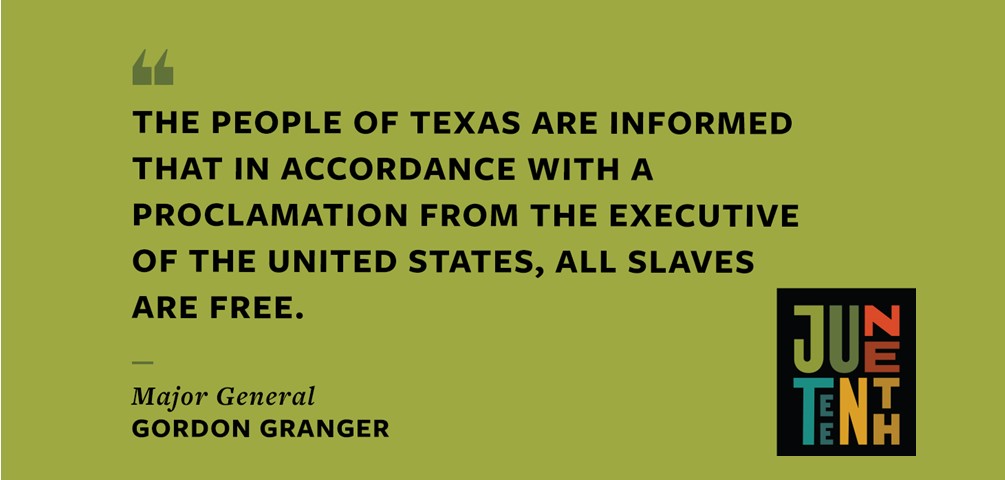
Diversity Equity Inclusion & Belonging - June 28, 2021
by Elisabeth (Beth) Kilgore-Robinson
History books teach us that the Emancipation Proclamation issued by President Abraham Lincoln on January 1, 1863, established that all enslaved people in the Confederate States “shall be then, thenceforward, and forever free.” However, the Emancipation Proclamation did not immediately free all enslaved people—it only applied to places under Confederate control and could not be enforced until Union troops took control. The Proclamation also did not apply to slave-holding border states loyal to the Union or any areas in Confederate states that were “not then in rebellion against the United States”—this included some areas of Louisiana and Virginia.
As the Union gained control of the Confederate South, the Emancipation Proclamation began to be enforced in those states. Slavery continued in the Confederate State of Texas into 1865. During the time from 1863 to 1865, many slave owners from other states migrated to Texas because it was known to be a “safe haven” for slavery, with more than 250,000 enslaved people living there.
Although the Civil War ended in April 1865, federal troops did not arrive in Texas until June 19. The day his troops arrived in Galveston, Texas, U.S. General Gordon Granger read to its citizens, “The people of Texas are informed that, in accordance with a proclamation from the Executive of the United States, all slaves are free.” While all enslaved people were not immediately freed in Texas after this reading of the Proclamation, celebrations began as rumors of freedom spread among those who were still enslaved.
On June 19, 1866, freed slaves in Texas organized the first Jubilee Day, an annual celebration which later became known as Juneteenth. The word Juneteenth is a combination of the words “June” and “Nineteenth” and commemorates the day federal troops arrived in Galveston to take control of the state and ensure that all enslaved people were freed. In December 1865, slavery in America was formally abolished with the ratification of the 13th Amendment. As formerly enslaved people migrated from Texas to other states across the country, the Juneteenth tradition spread and continues today as an annual celebration featuring music, food, prayer, family gatherings and other festivities. Juneteenth is also the oldest nationally celebrated commemoration of the ending of slavery in the United States.
Interestingly, in 1979, Texas became the first state to make Juneteenth an official holiday, but recognition of Juneteenth has varied across the United States over the years. Finally, on June 17, 2021, Juneteenth was officially recognized as a federal holiday.
If you want to learn more about Juneteenth, please try one of the following:
____________________
Beth Kilgore-Robinson is a social worker and Member Services Facilitator for Goodwin Living At Home. As a military spouse, she has provided social work services to adults, children and military members and their families in several states, as well as abroad in Germany and Italy. Many things have shaped her thoughts on race, culture, equality and humanness, including growing up in a home where her parents’ positive thoughts about being Black, their discussions on equality with her and her brothers and their spiritual education as it relates to being kind to others. Her hope is that individuals, households, neighborhoods, cities, states and the nation will begin to appreciate each person for who they are. She believes that being a part of the Diversity, Equity and Inclusion Committee is a great beginning and looks forward to expanding the “honor and uplift” we provide to each other, as we educate and learn from each other.
About the Diversity, Equality and Inclusion (DEI) Committee: We are a group of staff and residents who together serve a mission to educate, embrace and empower a workplace of diversity, equality and inclusion. Our vision is to seek open and honest communication and collaboration that will inform and celebrate the cultural, ethnic and sexual orientation of all members of our staff without bias.
Questions or comments? Please contact us dei@goodwinliving.org.
